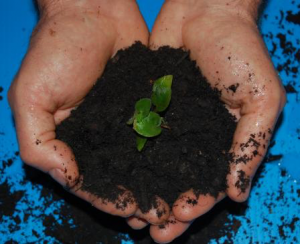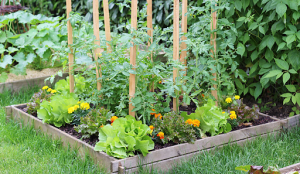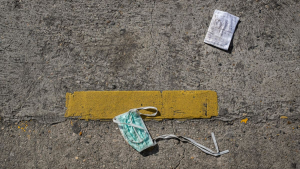Staying Safe, Green, and Clean
By Jana Haas; University of Maryland, College Park
The Covid-19 pandemic stay at home orders have reduced travel and manufacturing, simultaneously reducing related pollution. But what will happen when everything begins to go back to ‘normal’? Many of us have made a number of efforts to live more sustainably while at home or with limited forays outside. But will that change when pandemic-related lockdowns subside?
Green Habits
Reducing and Reusing in the Kitchen:
On average, the American household wastes $1,866 of food per year. This means about a third of the food bought in the United States is not being used. This does not mean that food is the only part going to waste, but the resources used to make the food including land, labor, energy, and water are going to waste as well. Despite such a high waste of food, there is also a great waste of other manmade materials such as plastic and cardboard. This is very high and can easily be reduced with some household changes. Given the time families have in light of the pandemic, this is a perfect time to adjust these wasteful habits and reduce waste in the kitchen. Some simple steps that can be taken to reduce waste in a household include planning meals ahead of time, minimizing or eliminating single-use plastic Ziplock bags in the house and using reusable containers as a substitute, and composting. These changes require little effort and can be done in the comfort of your home.
Composting:
Composting is an important part of a number of households and can be done in various environments. It is a great way to lower your individual carbon footprint by reducing the methane emissions from landfills, creating nutrient-rich soils to promote plant growth, and replacing chemical fertilizers. Depending on where you live you can compost either inside or outside. Inside, you can purchase a specific type of composting bin or hire a composting service to collect your food waste weekly; outside you can designate a shady area for the compost pile. Quarantine is a great time to begin composting as it can help keep you busy and allow you to get outside and engage in other related activities such as planting a garden.
Planting a garden:
As everyone knows there is a lot more free-time in people’s lives without commuting, so why not use this perfect opportunity to try new things such as planting a garden? The great aspects of gardening are that it gets you outside, which is good for your mood and overall health, it gives you something to look forward to, and is an activity that can be done no matter your age. A garden can be very complex or very simple; it can be a vegetable garden, herb garden, flower garden, or a mix of them. Gardening relates back to reducing and reusing in the kitchen as well as composting because growing in the garden lessens the amount you are buying which reduces packaging and ensures that you have ingredients that may not be in the stores especially during the pandemic where every week there is a new shortage of something. In addition, compost promotes plant growth and health. You can use the compost you created from the scraps in your kitchen and put all of it right back in the ground to enrich the soil.
Being Safe and Being Green
The number of patients admitted to the hospital has increased greatly during the pandemic. As a result, there is a greater need for healthcare workers during these times. Keeping them safe from the high rate of infections is important, therefore, the use of personal protection equipment (PPE) has greatly increased. Although the type of equipment needed for each job is different, typically, the manner of disposal is similar. Not only are healthcare workers wearing PPE, but people all around the world require some protection too anytime they leave their homes and go to a grocery store or public space. The equipment is one-time use due to its contaminated nature for healthcare workers but does not have to be for people running errands to the store. Of course, the precaution of wearing a mask is very important (and sometimes gloves), but non-reusable masks and plastic gloves can increase the negative impact they are having on the environment. There are a greater number of sustainable masks than gloves, but every effort helps during these times of crisis.
There are a great number of ways to be sustainable in your home, your habits, and your everyday life during quarantine, but how will those habits translate when life returns to ‘normal’? Will you return to your old ways or keep improving on the changes you have made and make this part of your new “normal”?
Bibliography
“The Average American Household Wastes $1,866 of Food per Year.” Futurity, 23 Jan. 2020, www.futurity.org/food-waste-united-states-sustainability-consumers/.
Borrás, Jo. “These Compostable, Disposable Gloves Are Ready for COVID-19 Fight.” CleanTechnica, 11 Apr. 2020, cleantechnica.com/2020/04/11/these-compostable-disposable-gloves-are-ready-for-covid-19-fight/.
“Composting At Home.” EPA, Environmental Protection Agency, 13 Nov. 2019, www.epa.gov/recycle/composting-home.
Crowley, Chris. “The Quarantine Garden Has Taken Off.” Grub Street, Grub Street, 5 May 2020, www.grubstreet.com/2020/05/the-quarantine-garden.html.
Fincher, Melanie. “15 Ways to Reduce Food Waste at Home-and Why You Should.” Allrecipes, Allrecipes, 3 Apr. 2020, www.allrecipes.com/article/reduce-food-waste/.
Food and Wine Staff. “No Waste Cooking: from Root to Tip.” FOOD AND WINE, FOOD AND WINE, 14 Apr. 2020, foodandwine.ie/features/no-waste-cooking-from-root-to-tip.
Geddes, Andrea. “10 Simple Ways to Reduce Plastic Waste in Your Kitchen.” The Cooking Collective, 2 June 2019, www.thecookingcollective.com.au/reduce-plastic-waste-in-your-kitchen/.
The Good Trade Staff. “19 Sustainable Brands Making Face Masks For Social Distancing.” The Good Trade, The Good Trade, 22 May 2020, www.thegoodtrade.com/features/reusable-face-masks.
“Staying Green Under Quarantine.” Quinte Waste Solutions, 14 Apr. 2020, quinterecycling.org/staying-green-under-quarantine/.
Sullivan, Justine. “5 Ways to Compost during the Coronavirus Pandemic.” Earth Day, 22 Apr. 2020, www.earthday.org/compost-vs-coronavirus-5-ways-to-compost-during-a-pandemic/.









